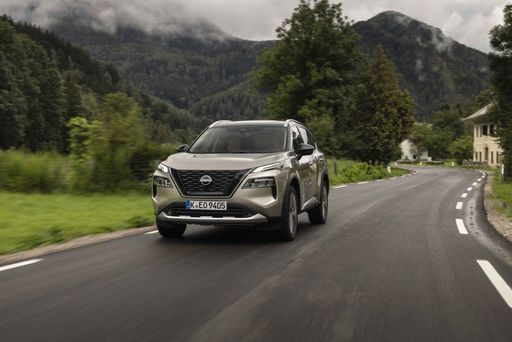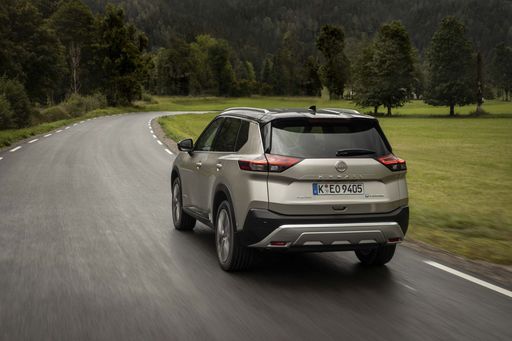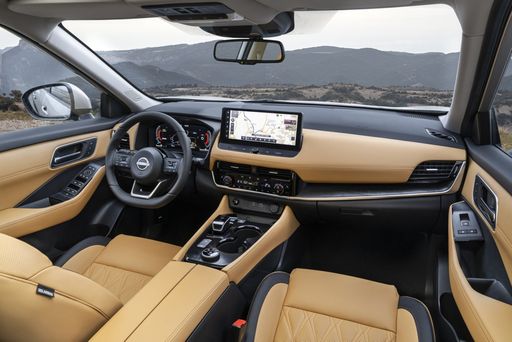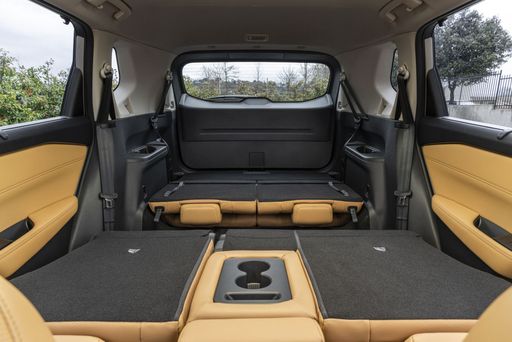When it comes to compact SUVs, two models that continuously capture the attention of car enthusiasts are the Nissan X-Trail and the VW Tiguan. Both vehicles offer a robust blend of comfort, technology, and performance, but which one stands out as the better option? Let's dive into a comprehensive comparison of these two popular SUVs.
Nissan X-Trail vs VW Tiguan – Which model is better for everyday use?
Two cars, one duel: Nissan X-Trail meets VW Tiguan.
Which one wins in performance, efficiency and value for money? Find out now!
Design and Dimensions
The Nissan X-Trail measures 4680 mm in length, 1840 mm in width, and 1720 mm in height. It boasts a bold exterior with a modern design that reflects its adventurous spirit. On the other hand, the VW Tiguan, slightly smaller, has dimensions of 4539 mm in length, 1842 mm in width, and 1658 mm in height. The Tiguan's design is characterized by sharp lines and a more understated elegance, appealing to those seeking a sophisticated aesthetic.
Powertrains and Performance
Under the hood, the Nissan X-Trail offers a variety of engine options, including petrol mild-hybrid and full-hybrid systems. The power outputs range from 163 HP to 213 HP, with torque figures reaching up to 525 Nm. The X-Trail is available in both front-wheel drive and all-wheel drive configurations, with a CVT or a reduction gearbox transmission, providing an engaging drive.
In contrast, the VW Tiguan presents a wider range of engine choices, including petrol, diesel, and hybrid variants. It features diverse power levels from 130 HP to a powerful 272 HP, offering robust performance across the lineup. The Tiguan also utilizes an automatic dual-clutch transmission, ensuring smooth shifts and improved response times.
Fuel Efficiency and Emissions
Fuel efficiency is a crucial factor for many buyers, and here both SUVs showcase commendable performances. The X-Trail achieves a consumption rate as low as 5.7 L/100 km, depending on the engine variant. For emissions, the CO2 output ranges from 131 g/km to 161 g/km, placing it in various efficiency classes such as D and E.
The VW Tiguan edges ahead in hybrid technology with its plug-in hybrid variant, offering an impressive electric range of up to 112 km. Its fuel consumption can drop to an astonishing 0.4 L/100 km for the hybrid, while other petrol versions average around 6.1 L/100 km. CO2 emissions range from a low of 8 g/km to 168 g/km, achieving efficiency classes as high as B, making the Tiguan a strong contender in sustainability.
Interior Comfort and Technology
Both the Nissan X-Trail and VW Tiguan promise a comfortable ride with ample space. The X-Trail can seat up to 7 passengers in its larger configuration, while the 5-seat version still provides excellent roominess and 585 liters of trunk space.
The VW Tiguan, designed primarily as a 5-seater, offers a trunk capacity of 652 liters, making it slightly more versatile in cargo storage for daily use. In terms of technology, both vehicles come equipped with advanced infotainment systems, but the Tiguan's interface is often praised for being more user-friendly. Both models incorporate smartphone connectivity, numerous safety features, and driver aids, ensuring a modern driving experience.
Driving Dynamics
Driving experience varies between the two models. The X-Trail, with its comfortable ride, excels in off-road capabilities thanks to the all-wheel drive option. It offers a serene cabin experience, ideal for long journeys and family trips.
The Tiguan, while also capable off-road, is often viewed as sportier, with a more engaging driving style. Its handling is sharper, making it enjoyable for those who like a more dynamic drive on paved roads. The suspension systems in both vehicles provide a good balance between comfort and sportiness.
Conclusion: Which SUV Should You Choose?
Ultimately, the decision between the Nissan X-Trail and the VW Tiguan boils down to individual preferences and priorities. The X-Trail is ideal for those needing additional seating capacity and a more rugged off-road experience, while the Tiguan appeals to those looking for a sophisticated design with advanced technology and impressive hybrid options. Both SUVs have their strengths, making it essential for potential buyers to consider what features matter most to their lifestyle.
Here’s where it gets real: The technical differences in detail
Costs and Efficiency:
When it comes to price and running costs, the biggest differences usually appear. This is often where you see which car fits your budget better in the long run.
VW Tiguan has a slight advantage in terms of price – it starts at 32800 £, while the Nissan X-Trail costs 34000 £. That’s a price difference of around 1243 £.
Fuel consumption also shows a difference: VW Tiguan manages with 0.40 L and is therefore convincingly more efficient than the Nissan X-Trail with 5.70 L. The difference is about 5.30 L per 100 km.
Engine and Performance:
Power, torque and acceleration say a lot about how a car feels on the road. This is where you see which model delivers more driving dynamics.
When it comes to engine power, the VW Tiguan has a distinct edge – offering 272 HP compared to 213 HP. That’s roughly 59 HP more horsepower.
In acceleration from 0 to 100 km/h, the VW Tiguan is a bit quicker – completing the sprint in 5.90 s, while the Nissan X-Trail takes 7 s. That’s about 1.10 s faster.
In terms of top speed, the VW Tiguan performs slightly better – reaching 242 km/h, while the Nissan X-Trail tops out at 200 km/h. The difference is around 42 km/h.
There’s also a difference in torque: Nissan X-Trail pulls distinct stronger with 525 Nm compared to 400 Nm. That’s about 125 Nm difference.
Space and Everyday Use:
Beyond pure performance, interior space and usability matter most in daily life. This is where you see which car is more practical and versatile.
Seats: Nissan X-Trail offers distinct more seating capacity – 7 vs 5.
In curb weight, VW Tiguan is barely noticeable lighter – 1599 kg compared to 1668 kg. The difference is around 69 kg.
In terms of boot space, the VW Tiguan offers to a small extent more room – 652 L compared to 585 L. That’s a difference of about 67 L.
In maximum load capacity, the VW Tiguan performs somewhat better – up to 1650 L, which is about 226 L more than the Nissan X-Trail.
When it comes to payload, Nissan X-Trail barely noticeable takes the win – 574 kg compared to 533 kg. That’s a difference of about 41 kg.
Who comes out on top?
Overall, the VW Tiguan shows itself to be is largely superior and secures the title of DriveDuel Champion.
It convinces with the more balanced overall package and proves to be the more versatile choice for everyday use.
 @ Volkswagen AG / VW Media
@ Volkswagen AG / VW Media
VW Tiguan
Nissan X-Trail
The Nissan X-Trail stands out with its spacious interior and practical design, making it an ideal choice for families and adventure enthusiasts alike. Its sleek exterior styling is complemented by modern technology features that enhance both driving pleasure and safety. This versatile SUV offers a comfortable ride, whether navigating city streets or exploring off-road paths, ensuring you travel in style and comfort.
details @ Nissan Motor Corporation
@ Nissan Motor Corporation
 @ Nissan Motor Corporation
@ Nissan Motor Corporation
 @ Nissan Motor Corporation
@ Nissan Motor Corporation
 @ Nissan Motor Corporation
@ Nissan Motor Corporation
VW Tiguan
The VW Tiguan blends sensible family practicality with a dash of German polish, delivering a calm, reassuring ride and a cabin that never feels like an afterthought. For buyers who want an SUV that’s easy to live with yet still nicely dressed, the Tiguan is the grown‑up choice that keeps a cheeky wink in reserve.
details @ Volkswagen AG / VW Media
@ Volkswagen AG / VW Media
 @ Volkswagen AG / VW Media
@ Volkswagen AG / VW Media
 @ Volkswagen AG / VW Media
@ Volkswagen AG / VW Media
 @ Volkswagen AG / VW Media
@ Volkswagen AG / VW Media
 @ Volkswagen AG / VW Media
@ Volkswagen AG / VW Media
 @ Volkswagen AG / VW Media
@ Volkswagen AG / VW Media
 @ Nissan Motor Corporation
@ Nissan Motor Corporation
|
 @ Volkswagen AG / VW Media
@ Volkswagen AG / VW Media
|
|
|
|
Costs and Consumption |
|
|---|---|
|
Price
34000 - 50400 £
|
Price
32800 - 51900 £
|
|
Consumption L/100km
5.7 - 6.9 L
|
Consumption L/100km
0.4 - 8.4 L
|
|
Consumption kWh/100km
-
|
Consumption kWh/100km
-
|
|
Electric Range
-
|
Electric Range
119 - 129 km
|
|
Battery Capacity
-
|
Battery Capacity
19.70 kWh
|
|
co2
131 - 161 g/km
|
co2
8 - 190 g/km
|
|
Fuel tank capacity
55 L
|
Fuel tank capacity
45 - 58 L
|
Dimensions and Body |
|
|---|---|
|
Body Type
SUV
|
Body Type
SUV
|
|
Seats
5 - 7
|
Seats
5
|
|
Doors
5
|
Doors
5
|
|
Curb weight
1668 - 1961 kg
|
Curb weight
1599 - 1890 kg
|
|
Trunk capacity
177 - 585 L
|
Trunk capacity
490 - 652 L
|
|
Length
4680 mm
|
Length
4539 mm
|
|
Width
1840 mm
|
Width
1842 - 1859 mm
|
|
Height
1720 mm
|
Height
1656 - 1658 mm
|
|
Max trunk capacity
1396 - 1424 L
|
Max trunk capacity
1486 - 1650 L
|
|
Payload
432 - 574 kg
|
Payload
460 - 533 kg
|
Engine and Performance |
|
|---|---|
|
Engine Type
Petrol MHEV, Full Hybrid
|
Engine Type
Plugin Hybrid, Petrol, Petrol MHEV, Diesel
|
|
Transmission
Automatic
|
Transmission
Automatic
|
|
Transmission Detail
CVT, Reduction Gearbox
|
Transmission Detail
Dual-Clutch Automatic
|
|
Drive Type
Front-Wheel Drive, All-Wheel Drive
|
Drive Type
Front-Wheel Drive, All-Wheel Drive
|
|
Power HP
163 - 213 HP
|
Power HP
130 - 272 HP
|
|
Acceleration 0-100km/h
7 - 9.6 s
|
Acceleration 0-100km/h
5.9 - 10.6 s
|
|
Max Speed
170 - 200 km/h
|
Max Speed
198 - 242 km/h
|
|
Torque
300 - 525 Nm
|
Torque
220 - 400 Nm
|
|
Number of Cylinders
3
|
Number of Cylinders
4
|
|
Power kW
120 - 157 kW
|
Power kW
96 - 200 kW
|
|
Engine capacity
1497 cm3
|
Engine capacity
1498 - 1984 cm3
|
General |
|
|---|---|
|
Model Year
2024
|
Model Year
2024 - 2025
|
|
CO2 Efficiency Class
F, D, E
|
CO2 Efficiency Class
B, G, D, E, F
|
|
Brand
Nissan
|
Brand
VW
|
Is the Nissan X-Trail offered with different drivetrains?
The Nissan X-Trail is offered with Front-Wheel Drive or All-Wheel Drive.
The prices and data displayed are estimates based on German list prices and may vary by country. This information is not legally binding.
